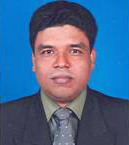 Dr. Jeyaseelan Gnanaseelan
Dr. Jeyaseelan Gnanaseelan
ELTU, Vavuniya Campus
University of Jaffna
English Discourse Analysis and Media Discourse Analysis were the main focuses of Dr. Jeyaseelan Gnanaseelan’s PhD thesis completed in 2009 at the Department of English, University of Madras, India. The study was conducted under the supervision of Dr. R. Azhagarasan. Interested in human security discourse analysis, Gnanaseelan’s effort was to trace and identify the apparent gap between the overt, foregrounded knowledge of human and political security in media discourse and the covert, backgrounded ideological implications of the discourses. Based on extensive studies on Sri Lankan ethnic and conflict related studies, he questioned the existing Sri Lankan English media model of editorials as it reveals the control of the media and political elites to sustain the existing power relations-political, economical, and cultural. In the context of the protracted political conflict in Sri Lanka for the last thirty years, the research attempts at unfolding the ideological attachment of the English media in commenting on the developments of the conflict resolution process and international relations. Gnanaseelan’s study is extremely insightful for the Sri Lankan media personnel in general, the politicians as well as policy makers in particular in directing the future language of national integrity, national question and political governance in the country. This is the first PhD in the field of English Newspaper Editorial Discourse Analysis completed under the NCAS grant scheme.
Research Abstract of PhD
ETHNIC CONFLICT AND INTERNATIONAL RELATIONS IN THE EDITORIALS OF SRI LANKAN ENGLISH NEWSPAPERS:A DISCOURSE ANALYSIS
This thesis attempts to make a discourse Analysis of the selected editorials of the Sri Lankan English newspapers on the ethnic conflict and international relations during the period between 2001 and 2006. It develops a multi-faceted view of the construction and representation of Sri Lankan Press’ stand on the Sri Lankan conflict and resolution issues under the international interventions.
The ethnic conflict is an intensive, political and military conflict since 1983 that has claimed the lives of more than 85,000 people. It is predominantly between the majority Sinhala community and the minority Tamil community. The conflict has caused extensive damage to the country. On Friday, 22 February, 2002, a Ceasefire Agreement based on a Memorandum of Understanding was made between the Government of Sri Lanka and the Liberation Tigers of Tamil Eelam. Consequently the peace process commenced but was not successful. It came under the scrutiny of the media. The press discourse is situated within the `master narratives’ of ‘War against Terrorism’ and ‘Security and Sovereignty of the State’, ‘threatened’ by ethnic conflicts all over the world.
This study addresses the research question: ‘How does the Sri Lankan English newspaper editorial discourse discursively construct social reality?’ This study looks at the ideological and social cognitive system used in the editorials. It traces the ideological and attitudinal positions of the Sri Lankan media. It takes up the Social Constructionist Approach, Critical Discourse and Metaphorical Discourse Analysis Approaches to develop new ways of interpretation. Textual characteristics (like recurring themes, discursive practices and interpretative repertoires, metaphors and scripts or frames, argumentation strategies, syntactical and lexical choices) of each editorial construction are discussed. There are five major discourses of semantic dichotomy in the pragmatic context of the Sri Lankan ethnic conflict : 1. international relations versus intra-national relations; 2. ethnic conflict versus terrorism; 3. federalism versus unitarism; 4. economic globalization versus ‘political’ globalization and (5) international intervention versus interference.
These three discourse analysis approaches allow an interpretation of existing presuppositions, and propositional attitudes that enhance the authorities of the State, ethnic and party -based and -biased discourse and socio-political ideologies naturalized, and dominated by the majority community. Nationally as well as internationally, different views are possible for different ethnic communities at the situational, institutional and societal levels. The editorials are analysed to affirm whether they implicitly support unilateral ethno nationalistic foreign policy interests, cultural nationalism cloaked by constitutional nationalism, thus falling in line with those theorists who argue that globalization facilitates inter state-security, and not intra-state security. This study also implicates a productive analysis of international politics in harmony with that of domestic politics. An understanding of media discourse using the discourse analysis approaches has been documented in previous researches conducted in the West but it has not been undertaken in Sri Lanka. The research thus hopes to contribute to the discourse studies of Sri Lankan media.